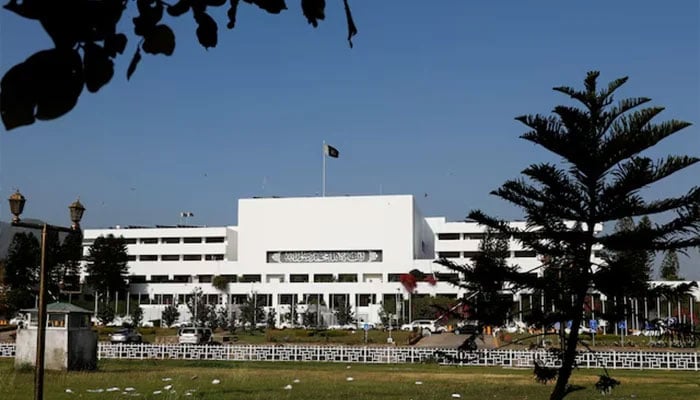No place to assemble
New law puts an unnecessary bureaucratic barrier in place for citizens who wish to protest
Parliament has passed the ‘Peaceful Assembly and Public Order Bill, 2024’ with a majority vote amid protest from opposition benches. Introduced as a private members' bill by members of different parties, the bill’s provisions are being decried as disturbingly restrictive. Once signed into law, it will place severe restrictions on the right to peaceful assembly, a fundamental democratic freedom enshrined in Article 16 of the constitution. Under this bill, any public assembly in Islamabad requires written approval from the district magistrate at least seven days in advance. This alone puts an unnecessary bureaucratic barrier in place for citizens who wish to protest. More disturbingly, the bill grants sweeping powers to authorities, allowing them to deny or revoke permission based on vague concerns such as ‘security risks’ or ‘public order’. The government also reserves the right to designate areas as ‘red zones’ or ‘high-security zones’, where assembly will be outright prohibited. While maintaining public order is essential, this bill goes far beyond reasonable restrictions by essentially criminalizing public gatherings without permission, with organizers and participants facing up to three years in prison, or up to ten years for repeat offences. This seems to be less about ensuring order and more about stifling dissent.
The law is a stark reminder of how such draconian measures later backfire – many times on the party or parties that introduced them. The infamous Ehtesab Bureau and the Prevention of Electronic Crimes Act (PECA) by the PML-N in its previous tenures were initially aimed at political rivals but eventually targeted the PML-N's own members. By legislating such sweeping powers today, parties risk creating a tool for future governments to silence protests and rallies planned by those that ruling today. What makes this law particularly problematic is the selective enforcement it is likely to encourage. Hate rallies and mobs that incite violence have often gone unchecked, while peaceful opposition protests have been subject to brutal crackdowns. The bill seems tailored not to maintain public order, but to target specific acts of assembling only. The Faizabad dharna verdict provided clear guidelines on how to manage protests without infringing on fundamental rights. It upheld the right to peaceful assembly while ensuring that protests do not infringe upon the rights of others. The government could have simply enforced these principles, but instead, it has chosen a clearly regressive and autocratic path.
By suppressing peaceful dissent, parliament is undermining the very democratic freedoms the ruling parties had themselves fought for not that long ago. The road to authoritarianism is often paved with laws like this, and all parties in power should be wary of the dangerous precedent they are setting. Instead of legislating away the right to protest, the government must remember that dissent is not a threat to democracy; it is its lifeblood. It is well worth our time to remember what Article 16 of the constitution says about freedom of assembly: “Every citizen shall have the right to assemble peacefully and without arms, subject to any reasonable restrictions imposed by law in the interest of public order.” The law just passed would hardly pass the ‘reasonable’ test.
-
 Andrew, Sarah Ferguson Refuse King Charles Request: 'Raising Eyebrows Inside Palace'
Andrew, Sarah Ferguson Refuse King Charles Request: 'Raising Eyebrows Inside Palace' -
 Adam Sandler Reveals How Tom Cruise Introduced Him To Paul Thomas Anderson
Adam Sandler Reveals How Tom Cruise Introduced Him To Paul Thomas Anderson -
 Washington Post CEO William Lewis Resigns After Sweeping Layoffs
Washington Post CEO William Lewis Resigns After Sweeping Layoffs -
 North Korea To Hold 9th Workers’ Party Congress In Late February
North Korea To Hold 9th Workers’ Party Congress In Late February -
 All You Need To Know Guide To Rosacea
All You Need To Know Guide To Rosacea -
 Princess Diana's Brother 'handed Over' Althorp House To Marion And Her Family
Princess Diana's Brother 'handed Over' Althorp House To Marion And Her Family -
 Trump Mobile T1 Phone Resurfaces With New Specs, Higher Price
Trump Mobile T1 Phone Resurfaces With New Specs, Higher Price -
 Factory Explosion In North China Leaves Eight Dead
Factory Explosion In North China Leaves Eight Dead -
 Blac Chyna Opens Up About Her Kids: ‘Disturb Their Inner Child'
Blac Chyna Opens Up About Her Kids: ‘Disturb Their Inner Child' -
 Winter Olympics 2026: Milan Protestors Rally Against The Games As Environmentally, Economically ‘unsustainable’
Winter Olympics 2026: Milan Protestors Rally Against The Games As Environmentally, Economically ‘unsustainable’ -
 How Long Is The Super Bowl? Average Game Time And Halftime Show Explained
How Long Is The Super Bowl? Average Game Time And Halftime Show Explained -
 Natasha Bure Makes Stunning Confession About Her Marriage To Bradley Steven Perry
Natasha Bure Makes Stunning Confession About Her Marriage To Bradley Steven Perry -
 ChatGPT Caricature Prompts Are Going Viral. Here’s List You Must Try
ChatGPT Caricature Prompts Are Going Viral. Here’s List You Must Try -
 James Pearce Jr. Arrested In Florida After Alleged Domestic Dispute, Falcons Respond
James Pearce Jr. Arrested In Florida After Alleged Domestic Dispute, Falcons Respond -
 Cavaliers Vs Kings: James Harden Shines Late In Cleveland Debut Win
Cavaliers Vs Kings: James Harden Shines Late In Cleveland Debut Win -
 2026 Winter Olympics Snowboarding: Su Yiming Wins Bronze And Completes Medal Set
2026 Winter Olympics Snowboarding: Su Yiming Wins Bronze And Completes Medal Set




